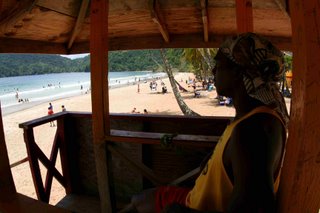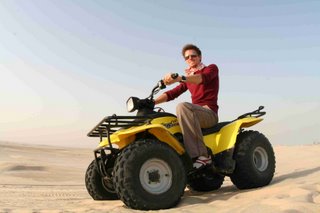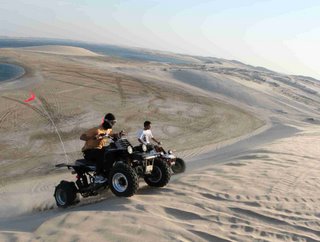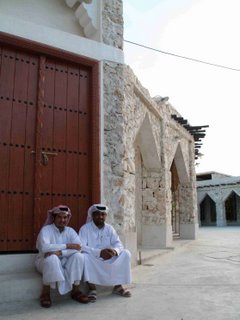Friday, March 09, 2012
Wednesday, May 21, 2008
Indonesia Impressions
 Here's the view from my apartment. The contrast between
Here's the view from my apartment. The contrast between Another contrast struck me yesterday and made me laugh out loud. I was in a supermarket and had forgotten to weigh my bananas before going to pay. The checkout chick waved a little blue flag and, within heartbeats, a young chap on rollerblades, with a walkie-talkie clipped to his belt came skidding over. She gabbled something in bahasa and he went whizzing off down the aisles. It was only moments before the girl's own walkie talkie crackled back the relevant code. Can you imagine such a thing in
And again, today, I had an amusing conversation with my driver. He was quizzing me about life in London and asking if we had as many motorbikes on the roads (here, the bikes congregate at traffic lights in great swarms and clog the gaps between cars like vehicular Polyfilla). He mused that we probably didn't have the cheap Korean import bikes which dominate the streets of
Jakarta has its own version of London Congestion Charge. At certain times of the day, it is illegal to drive into the central downtown area with fewer than 3 people in your car (unless you're in a bus or licenced taxi). The rule is enforced by a cordon of police officers who patrol the boundary giving out on-the-spot fines of R200,000. As a result, a little industry has sprung up. Go a couple of hundred yards outside the boundary and you'll see people standing by the roadside holding their hand up with a single finger extended - the code which identifies their profession. For R10,000, these 'jockeys' (as they are locally known) will sit in your car until you cross the police cordon, then they dismount and walk back outside for the next lonely driver. Very creative!
Saturday, March 01, 2008
Delta Dignitaries

Saturday, February 16, 2008
Neo-Nigerionics
 Nigeria's late poet-laureate was once asked in an interview for his opinion on the possibility of developing tourism in Nigeria. He replied:
Nigeria's late poet-laureate was once asked in an interview for his opinion on the possibility of developing tourism in Nigeria. He replied: "Only a masochist with an exuberant sense of self-destruction would choose Nigeria as a holiday destination". Not exactly an encouraging advertisement, but unfortunately it's true. Try telling 10 people that you're going to Nigeria, and their responses will give you a sense of the Herculean task to repair its battered reputation (a process the government rather injudiciously calls 'image-laundering'). But the changes required run deeper than mere cosmetics. Nigeria faces a raft of endemic problems, which will not be easily unravelled. Against a backdrop of stubbornly institutionalised corruption, some of the toughest questions are these:
- How can a government be persuaded to view the population as a resource worth investing in, when it has negligible tax collection capability and a plentiful supply of revenue from natural resources? And, with a growing population and declining reserves, what will be the consequences of failing to make this investment?
- Is it possible to legitimately win an election in a corrupt system? And, if it is not, should we forgive the victor if he uses his power to fix the faults which he exploited to win it in the first place (as the current President seems to be doing)?
- If the government is a majority shareholder in the operations of foreign investors (multinational oil companies, in this case), who should be responsible for repairing the negative impact of those operations on people and the environment?
Sunday, February 10, 2008
South Africa Stories

Monday, April 23, 2007
Tuesday, March 06, 2007
Trinidad Carnival
Monday, October 23, 2006
Counter-Colombia

 Forget what you thought you knew about Colombia - drugs, guerillas, murder and kidnapping. It is a wonderful place, and thoroughly underappreciated by the world. The people are both disarmingly warm and strikingly beautiful. The nightlife is phenomenal (we were out until 7am this morning and have been out almost every night). And Bogota is COLD! 2,600m above sea level - high enough that some people suffer from the altitude. We are set up in a nice house, complete with a live-in security guard (who lives in the garage and we have named Igor) and a Sheesha, which is a nice way to relax after work (see pic).
Forget what you thought you knew about Colombia - drugs, guerillas, murder and kidnapping. It is a wonderful place, and thoroughly underappreciated by the world. The people are both disarmingly warm and strikingly beautiful. The nightlife is phenomenal (we were out until 7am this morning and have been out almost every night). And Bogota is COLD! 2,600m above sea level - high enough that some people suffer from the altitude. We are set up in a nice house, complete with a live-in security guard (who lives in the garage and we have named Igor) and a Sheesha, which is a nice way to relax after work (see pic).
Tuesday, September 26, 2006
Revolutionary Rumblings
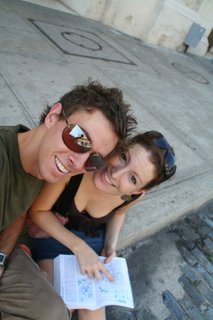 Life is very limited if you are a Cuban. You totter along the poverty line - poor, but not starving. As you navigate the potholed streets of your small country, overbearing posters of Fidel Castro and Che Guevara stare down at you with encouraging slogans such as 'Vamos Bien' ('We are doing well'). But evidence of that is sparse. You have no access to meaningful newspapers, it is illegal for you to enter an internet cafe, and you have to be a doctor, lawyer or public servant to have an e-mail address. It is almost impossible for you to leave the country and Community Watch Programs encourage friends and neighbours to report any anti-government rumblings in your politics. Who knows? Maybe Fidel will finally roll over and the light of liberalism and capitalism will brighten your prospects, as American investors and tourists bring their dollars to bear. Or perhaps the chaos of the transition will attract mafia sharks and faceless and exploitative corporations. Either way, the days of Cuba's unique character are numbered. Get there while you still can. Me and my sister had a ball.
Life is very limited if you are a Cuban. You totter along the poverty line - poor, but not starving. As you navigate the potholed streets of your small country, overbearing posters of Fidel Castro and Che Guevara stare down at you with encouraging slogans such as 'Vamos Bien' ('We are doing well'). But evidence of that is sparse. You have no access to meaningful newspapers, it is illegal for you to enter an internet cafe, and you have to be a doctor, lawyer or public servant to have an e-mail address. It is almost impossible for you to leave the country and Community Watch Programs encourage friends and neighbours to report any anti-government rumblings in your politics. Who knows? Maybe Fidel will finally roll over and the light of liberalism and capitalism will brighten your prospects, as American investors and tourists bring their dollars to bear. Or perhaps the chaos of the transition will attract mafia sharks and faceless and exploitative corporations. Either way, the days of Cuba's unique character are numbered. Get there while you still can. Me and my sister had a ball.
Tuesday, August 29, 2006
Vulcanology For Dummies
 The twilight view from our hotel room at the foot of an active volcano, which erupts as many as 80 times every day! The rumbling is loud enough to wake you up. And, yes, those are red hot rocks the size of cars rolling down the side of the mountain. I can't help wondering if the average life expectancy of the town's residents might be marginally lower than the average - reflecting the slight - but constant - stress of living in the shadow of such an unpredictable beast.
The twilight view from our hotel room at the foot of an active volcano, which erupts as many as 80 times every day! The rumbling is loud enough to wake you up. And, yes, those are red hot rocks the size of cars rolling down the side of the mountain. I can't help wondering if the average life expectancy of the town's residents might be marginally lower than the average - reflecting the slight - but constant - stress of living in the shadow of such an unpredictable beast.
Sunday, August 20, 2006
Jamaican me crazy!
Sunday, July 23, 2006
Monday, May 22, 2006
Camel racing technology
 You know what a typical racing camel costs? About £700,000. When I met my first racing camel, I pointed out to its owner - a local Sheikh who is also the brother of the Emir (Qatar's King) - that you could buy a collection of Ferraris for that price. He replied: "I've got one of those too". Fair enough. Anyway, camel racing is a Qatari passion but a hobby reserved for the extremely wealthy (there's no money to be made, since gambling is illegal). Tactics are limited - since they all run in a straight line - so owners used to gain advantages by using smaller jockeys. Unfortunately, these tended to be young Philippino boys who would frequently get injured in collisions between these souped-up ruminant mammalian speed machines. So, the government reluctantly banned the use of human jockeys. Enter the 'Robot Jockey' (look closely at the picture above). Sounds impressive, right? Envisioning something out of a Sci-Fi movie? Think again. Despite the reported $1bn invested in technologies to replace the young Philippinos, the accepted alternative is now......a cordless drill. Mounted on the camel's back in a wooden shoe-box. With a plastic whip jammed in the chuck. The owner simply drives madly alongside his camel waving a remote control out of the window. When he wishes to 'motivate' his entrant, he simply presses the remote; activating the drill; which whips the hapless beast into a state of acceleration. To be fair, the owners do at least dress up the boxes in jockey uniforms. With matching hats. I'm sure the camels are delighted.
You know what a typical racing camel costs? About £700,000. When I met my first racing camel, I pointed out to its owner - a local Sheikh who is also the brother of the Emir (Qatar's King) - that you could buy a collection of Ferraris for that price. He replied: "I've got one of those too". Fair enough. Anyway, camel racing is a Qatari passion but a hobby reserved for the extremely wealthy (there's no money to be made, since gambling is illegal). Tactics are limited - since they all run in a straight line - so owners used to gain advantages by using smaller jockeys. Unfortunately, these tended to be young Philippino boys who would frequently get injured in collisions between these souped-up ruminant mammalian speed machines. So, the government reluctantly banned the use of human jockeys. Enter the 'Robot Jockey' (look closely at the picture above). Sounds impressive, right? Envisioning something out of a Sci-Fi movie? Think again. Despite the reported $1bn invested in technologies to replace the young Philippinos, the accepted alternative is now......a cordless drill. Mounted on the camel's back in a wooden shoe-box. With a plastic whip jammed in the chuck. The owner simply drives madly alongside his camel waving a remote control out of the window. When he wishes to 'motivate' his entrant, he simply presses the remote; activating the drill; which whips the hapless beast into a state of acceleration. To be fair, the owners do at least dress up the boxes in jockey uniforms. With matching hats. I'm sure the camels are delighted.
Sunday, April 30, 2006
Wednesday, April 19, 2006
Trivia
Sunday, April 16, 2006
Lost in the desert
 I'm not yet sure what to make of Qatar. Only around 20% of the population is actually Qatari, making it a nation of immigrants - Indian, Pakistani, Somali, Philippino etc - all living under a relatively oppressive system which is not their own. The idea that a country's politcal system, legislature and culture should be so dictated by religion runs completely contrary to my own beliefs and experience. Which makes it difficult to reconcile the contrast between the educated, wealthy, well-travelled and sophisticated people, and the surrounding system of inequality and classism. Women only recently got the vote, but they are still limited in many ways - many banks and restaurants have separate areas for men and women (invariably the womens' section is small, under-staffed and hidden around the back). On the other hand, the people are welcoming and friendly. They have exquisite taste and they walk around in full length, blindingly white robes, looking like Persil adverts. They are also mad about anything that goes fast (cars, bikes, jetskis etc). While on a desert safari last weekend, I saw a couple of them nearly killing themselves, jumping (!) their 4X4 Toyota Land Cruisers off three-storey high sand dunes. I guess the absence of drugs, alcohol and girls means they have to find fun elsewhere!
I'm not yet sure what to make of Qatar. Only around 20% of the population is actually Qatari, making it a nation of immigrants - Indian, Pakistani, Somali, Philippino etc - all living under a relatively oppressive system which is not their own. The idea that a country's politcal system, legislature and culture should be so dictated by religion runs completely contrary to my own beliefs and experience. Which makes it difficult to reconcile the contrast between the educated, wealthy, well-travelled and sophisticated people, and the surrounding system of inequality and classism. Women only recently got the vote, but they are still limited in many ways - many banks and restaurants have separate areas for men and women (invariably the womens' section is small, under-staffed and hidden around the back). On the other hand, the people are welcoming and friendly. They have exquisite taste and they walk around in full length, blindingly white robes, looking like Persil adverts. They are also mad about anything that goes fast (cars, bikes, jetskis etc). While on a desert safari last weekend, I saw a couple of them nearly killing themselves, jumping (!) their 4X4 Toyota Land Cruisers off three-storey high sand dunes. I guess the absence of drugs, alcohol and girls means they have to find fun elsewhere!
Thursday, February 09, 2006
Monday, January 30, 2006
Fowl play
Tuesday, January 24, 2006
Nothing's Ghana stop us now
 You know when you walk out of a bank carrying a supermarket shopping bag stuffed to bursting with paper money? No? Well, come to Ghana and take out one week's expenses and that's exactly what you'll get - easily enough volume of cash to fill a couple of briefcases. In fact, had the bags not been a flimsy plastic affair, I would have had it handcuffed to my wrist. Sadly, the highest denomination note here is worth about £1.25 (20,000 Cedis).
Work has taken over again - 8am to 11pm is about standard - but we're looking forward to a relaxing weekend.
P.S. In the street a couple of days ago, I encountered a troupe of kids who were putting on a gymnastic display by the side of the road, and collecting donations. They were remarkable. Here's a photo. Drop me an e-mail if you get a chance, or leave a 'Comment' for posterity. 'Mehung echri' ('see you later') x
You know when you walk out of a bank carrying a supermarket shopping bag stuffed to bursting with paper money? No? Well, come to Ghana and take out one week's expenses and that's exactly what you'll get - easily enough volume of cash to fill a couple of briefcases. In fact, had the bags not been a flimsy plastic affair, I would have had it handcuffed to my wrist. Sadly, the highest denomination note here is worth about £1.25 (20,000 Cedis).
Work has taken over again - 8am to 11pm is about standard - but we're looking forward to a relaxing weekend.
P.S. In the street a couple of days ago, I encountered a troupe of kids who were putting on a gymnastic display by the side of the road, and collecting donations. They were remarkable. Here's a photo. Drop me an e-mail if you get a chance, or leave a 'Comment' for posterity. 'Mehung echri' ('see you later') x






